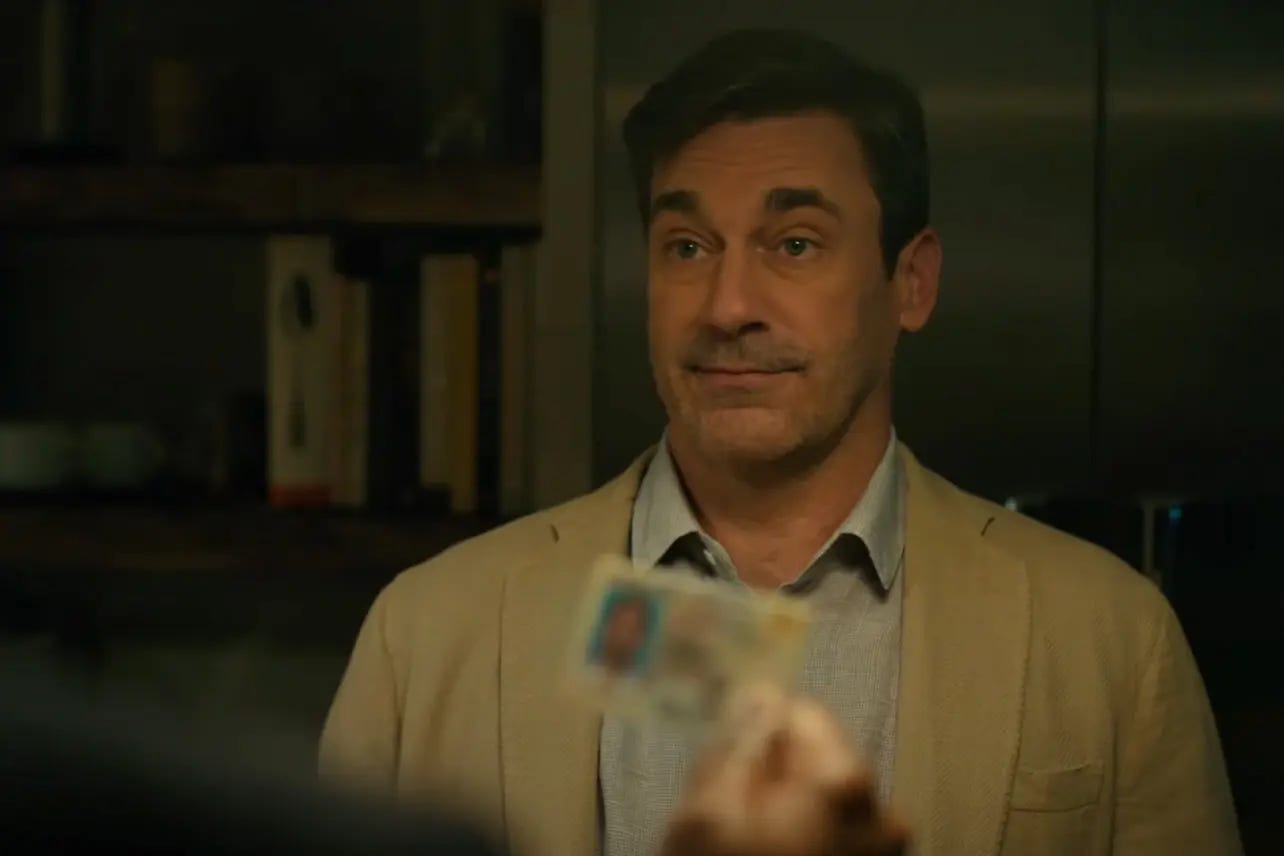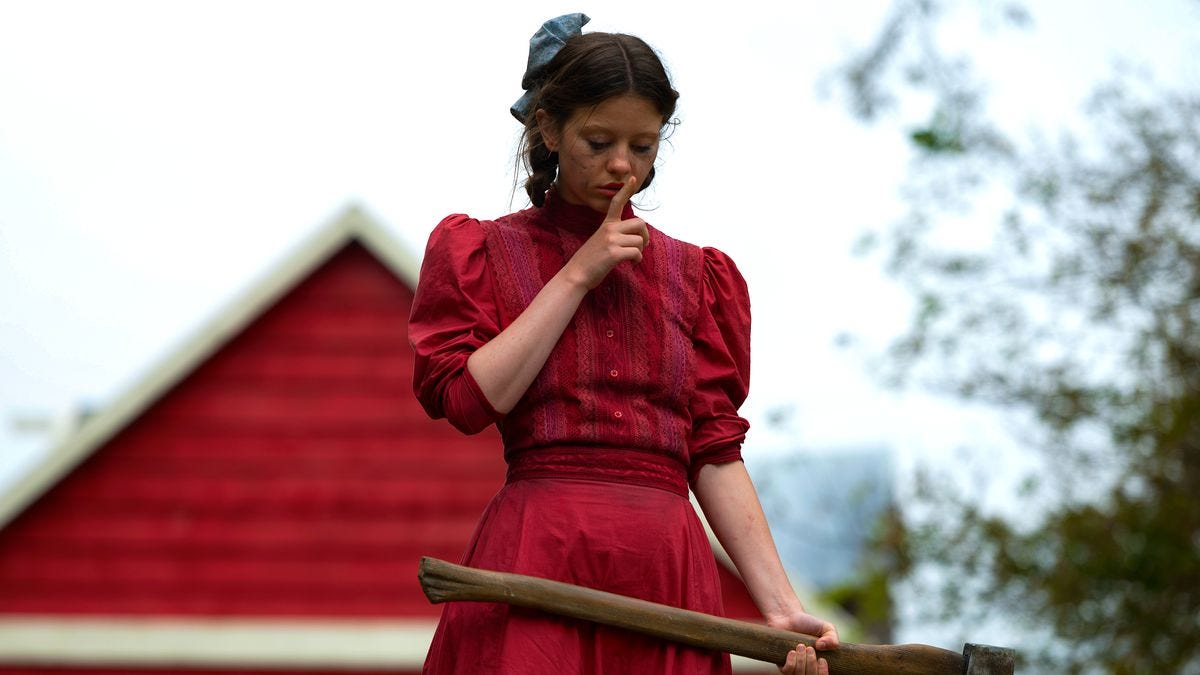In Review: 'Confess, Fletch,' 'The Woman King,' and 'Pearl'
Sometimes there are so many new movies we can't get to them all in time. Here are a few we didn't want to fall through the cracks while they were still playing.
Confess, Fletch
Dir. Greg Mottola
99 min.
While whistling his way into a rental apartment in Boston, his latest stop in the global amble that defines his life, Irwin M. Fletcher (Jon Hamm) doesn’t seem that surprised to find a dead body on the lower floor. This sort of thing happens to him all the time. He puts in a call directly to the local precinct and the operator asks him why he hasn’t called 911. “The emergency part is kind of over,” he says. He suggests she alert the homicide department: “They like murders. They’ll be interested.” Fletch will be the prime suspect. He seems to know that, too. This sort of thing happens to him all the time.
Based on Gregory McDonald’s novel, the thoroughly delightful Confess, Fletch has more in common with the mumbly, knockabout Philip Marlowe of Robert Altman’s The Long Goodbye than the obnoxious goofball of Chevy Chase’s Fletch movies. Co-writer/director Greg Mottola, whose work includes The Daytrippers and Adventureland, sticks closer to the source and gets the tone precisely right, sending our hero through a deliciously knotty mystery around a stolen Picasso while leaving him enough space to improvise his way through it. It is entirely to the film’s favor to say that murder has never felt so low-stakes.
All the mayhem relates to the theft of several expensive paintings—the Picasso chief among them—from an Italian who has also been kidnapped. At the prompting of the owner’s daughter (Lorenza Izzo), who happens to be his girlfriend, Fletch is in Boston investigating the theft when he discovers the body, which adds to his extensive to-do list. As the police, led by the methodical “Slo-Mo” Monroe (Roy Wood Jr.), try to pin the murder on him, Fletch introduces himself to a range of weirdoes with connections to the case: A shady art dealer (Kyle MacLachlan) who’s known as a germaphobe and Electronic Dance Music enthusiast; an Italian Countess (Marcia Gay Harden) with a ridiculous accent and a seductive nature; and a nosy bohemian neighbor (Annie Mumolo) whose dog pees on the floor when it’s hungry—which it always is.
Mottola does everything possible to make Fletch’s encounters with these oddballs the heart of the movie. Fletch speaks botched Italian with his girlfriend during pillow talk (“I want to swim in your eyes like a piss”), brushes off police inquiries with fun facts about pigs he just learned from a podcast (“Do you know they never sweat? And they have the longest orgasms of any mammal”), and nods along with the Countess describing herself as “half-Brazilian, half-Italian, and half-French.” Even when he’s arrested and shot at, nothing ever phases him, and Confess, Fletch follows in kind, adopting a tone of comic curiosity and breezy irreverence, confident that the eccentric particulars of human behavior will be enough to carry it along. Mottola and Hamm make it look easy, but the scarcity of entertainments this satisfyingly feather-light suggests that it isn’t. — Scott Tobias
Confess, Fletch is playing in limited release and is available on PVOD. It will be available on Showtime on October 28.
The Woman King
Dir. Gina Prince-Bythewood
135 min.
The Woman King, a new historical drama directed by Gina Prince-Bythewood (Love & Basketball, The Old Guard), wastes little time setting a tone. Set in 1823 in the West African kingdom of Dahomey (now a part of Benin), it opens with a scene of shocking fierceness in which a group of armed women descend on a camp of men in service of the rival Oyo Empire. Members of the Agojie, an elite fighting force in the service of Dahomey’s king, the women visit nothing short of total annihilation on their enemies. One unfortunate victim even loses his eyes to an Agojie warrior’s claw-like (but, as we’ll see later, immaculately maintained) nails. The Agojie offer no quarter, taking their cues from their pitiless leader General Nanisca (Viola Davis), who, not one to stand on the sidelines, claims some kills of her own. The film skips past addressing potential audience qualms about whether women can be as tough and deadly as men right away so it can dwell on other matters. Chief among them: what kind of price does this toughness exact, what kind of toll does it take over the course of a lifetime, and what does a life in the service of a just cause and in the company of like-minded women offer in compensation?
The film mostly lets Davis’s performance supply the answers. With her unsmiling face and scarred body Nanisca doesn’t really need many words to tell her story. An Agojie lifer, she’s risen through the ranks because of her commitment to military discipline, a virtue she seeks to instill in all who would join. These include Nawi (Underground Railroad star Thuso Mbedu), a slight but determined 19-year-old given over to the Agojie by her father after she refuses to marry an abusive but wealthy man. Nawi comes to the Agojie in awe of what they can do, but still willing to question orders and traditions, even as Dahomey’s conflict with the Oyo enters a dangerous new phase.
Written by veteran screenwriter Dana Stevens from a story by Maria Bello, The Woman King mixes personal drama and action with a Hollywood-tested soft serve approach to history. The film interrogates the righteousness of the Agojie — whose membership demands unquestioning loyalty and chastity — a little, but never enough to muddy its idealized badassdom. Furthermore, Dahomey’s wealth came from the slave trade, a practice facilitated by the Agojie. The film acknowledges this without directly depicting the practice directly and keeps circling back to scenes in which Nanisca acts as a voice of compassionate reason calling on the nation’s leader King Ghezo (John Boyega, in an amusing and unflattering depiction of pampered royalty) to pursue other paths.
It’s a case of fact and fiction not squaring up, but that’s hardly a rarity when it comes to historical dramas, and The Woman King never really tries to hide the 21st century attitudes it brings to the 19th century past. The intrusion of the contemporary extends to an impressively choreographed musical performance and a contest between Agojie’s new additions that includes an American Ninja-style obstacle course, if American Ninja ever required its contestants to crawl through yards of flesh-tearing thorns.
The Woman King’s attempts to have it both ways by delving into the horrors of the slave trade without fully distancing Dahomey from it can make the movie feel a bit wobbly at times, but Davis, Mbedu and the supporting cast (particularly Lashana Lynch as Nanisca’s trusted lieutenant Izogie) let their characters’ personal drama take precedence — and with it a stirring sense of sisterly unity in the face of adversity — over the historical fuzziness. Davis conveys the bone-deep weariness that comes with Nanisca’s heroism and commitment, suggesting the same awaits Nawi or any Agojie to survive to middle age.
Then there’s the combat scenes, which Prince-Bythewood with bone-crunching impact and with a clarity and physicality that puts most contemporary action movies to shame. Other concerns drift away in a sea of rousing, screen-filling spectacle of explosions, clashing swords, and bodies locked in combat. That’s another thing historical dramas can do beyond streamlining history into tales of heroism in which right clashes with wrong and The Woman King does with great skill and admirable sharpness, even while softening its edges elsewhere. —Keith Phipps
The Woman King is in theaters everywhere.
Pearl
Dir. Ti West
102 min.
In the first of many references to The Wizard of Oz in Pearl, his clever and multi-layered prequel to X, director Ti West starts with a perverse riff on the moment when Dorothy’s home finally settles after a twister and she opens the door to Oz, giving us a pop of three-strip Technicolor after the sepia-toned black-and-white of Kansas. Only here, a barn door opens to the verdant green of rural Texas and the pristine yellow of the farmhouse behind it, which might get a laugh from those who saw X and recognize that same farmhouse as the dilapidated hovel where most of a porn crew gets slaughtered by its elderly residents. A lot can change in 61 years. The question is: Are we watching Dorothy here or The Wicked Witch of the West?
In her dual role in X, Mia Goth played both victim and villain, an ingenious conceit that drew strong associations between Maxine, her wannabe porn star, and Pearl, a vicious killer whose sublimated desire and melancholy are not quite muted by her psychosis. There’s a story to Pearl that West and Goth could only hint at in X, and now it’s here as a boldly colored period piece that realizes her curdled youthful fantasies as a seemingly incongruous mix of camp comedy and psychological horror. That it hangs together as well as it does owes much to Goth’s superb performance, which frames Pearl as a deranged ingenue whose dreams of being in the movies are throttled by her circumstances and her mental health—to say nothing of her talent.
Making sly reference to another pandemic, the “Spanish flu” that ripped through the country in the late teens, Pearl opens in 1918, when the threat of the deadly virus further isolates a family of German immigrants on their Texas homestead. With her husband Howard off fighting in World War I, Pearl fears that she will spend the prime of her life with her cold, castigating mother (Tandi Wright) as they look after her father, whose unspecified illness has left him a drooling paralytic. When in town to get medicine and supplies—masked up, of course—Pearl often slips into a matinee and develops a friendship with the theater’s handsome projectionist (David Corenswet), who encourages her to follow her dreams. Against her mother’s wishes, Pearl seeks to audition for a traveling Christmas show, hoping it will be her ticket to fame.
Fate has other ideas. Or maybe, as the film suggests, the gremlins in Pearl’s psyche cannot be vanquished. West approaches Pearl through a heightened, self-aware camp that recalls the underrated 2007 François Ozon film Angel, which paid homage to David O. Selznick’s colorful melodramas while putting a cheerfully demented narcissist at its center. Goth’s Pearl may be a tragicomic creation, but she takes her dreams seriously, which serves as a bulwark against the synthetic glibness that might have creeped into the film. Everyone is the hero of their own story and Goth plays her as a young woman who’s trying to escape from two prisons at once—the terminal obligations of her austere, joyless life on the farm and the dark impulses that cloud her head like a toxic fog.
Though he does offer a few clever nods to X—the farm’s adjoining pond still has its hungry reptilian resident—West doesn’t treat Pearl like the typical prequel where the look and tone is integrated with the original film. Just as X has the grimy texture of a porn-chic ‘70s print that had spent decades in the canisters, Pearl echoes the unnaturally vibrant color of the three-strip era, when everything could be made to look like a fantasy. Even the homicidal can dare to dream. — Scott Tobias
Pearl is currently playing in limited release.











I was at a horror fest at an upstate NY drive in this weekend, and I must confess I kept watching PEARL on another screen, thinking "Damn, that looks good."
Also: MORE HAMM FLETCH PLZ
I'm happy to have caught CONFESS, FLETCH this afternoon. Thoroughly enjoyable. Only occasionally did I sense the shade of Chevy Chase hovering behind Hamm, but then again, only occasionally did I sense the shade of the original novels hovering behind Chase in his flicks. Hamm is a much better fit for Fletch's beach-bum persona, and I really like the shaggy amiability of the ensemble. Especially fun to see Hamm and Slattery together slinging zingers in a new setting.
I can understand updating the police detective from the novel to Roy Wood Jr.'s Slo-mo Monroe, but the original Flynn was a quirky and distinct enough character to go solo in four novels of his own. I like Wood, but Monroe doesn't seem like a character that could headline a movie. Of course, given the fact that I only learned of this movie a few days ago from Scott's Twitter, one can infer that no one at the studio thought Fletch could headline a movie these days either.
I hope Hamm's Fletch gets another outing.